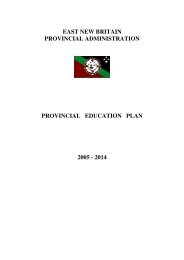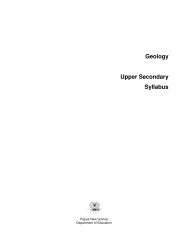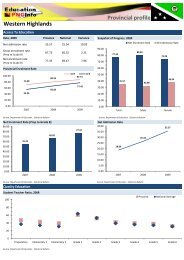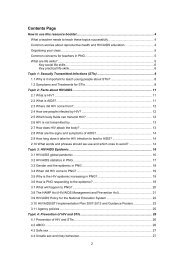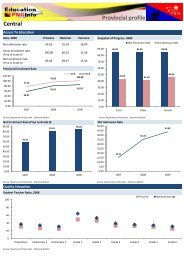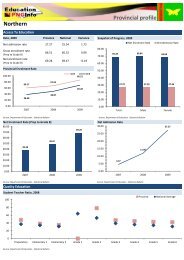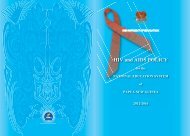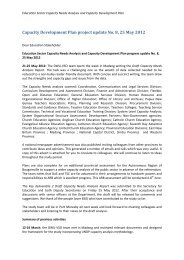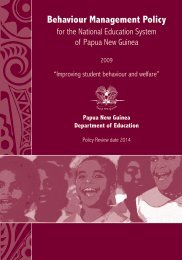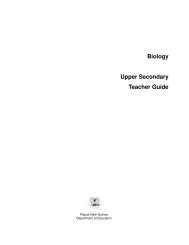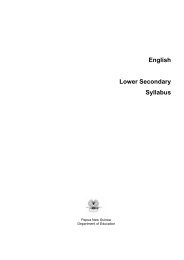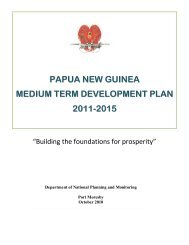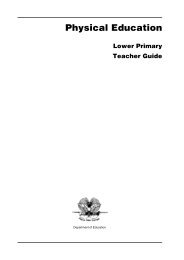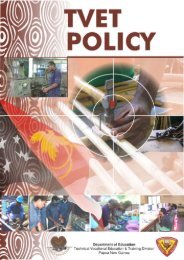TSC History - A Teaching Service for Independance - Department of ...
TSC History - A Teaching Service for Independance - Department of ...
TSC History - A Teaching Service for Independance - Department of ...
- No tags were found...
You also want an ePaper? Increase the reach of your titles
YUMPU automatically turns print PDFs into web optimized ePapers that Google loves.
HISTORYA <strong>Teaching</strong> <strong>Service</strong> <strong>for</strong> Independence - 1970 to 1975The <strong>Teaching</strong> <strong>Service</strong> was born on the 1 st July 1970.This followed the recommendation <strong>of</strong> the Weedon ReportWhy was the <strong>Teaching</strong> <strong>Service</strong> needed?Be<strong>for</strong>e the <strong>Teaching</strong> <strong>Service</strong> was <strong>for</strong>med, teachers were employed by many different agencies, missions and theGovernment.The salaries and conditions <strong>of</strong> teachers varied greatly from one employer to another employer. Teachers found itdifficult to transfer from one system to another and teachers who were trained by one agency worked <strong>for</strong> that agencyonly. Teachers trained by the government expected to receive the same pay as public servants at the time. Otherteachers employed by missions only got paid a stipend by their agencies. The conditions <strong>of</strong> teachers variedconsiderably from agency to agency. In general government teachers were paid better than mission teachers andalso lived and worked under better conditions than their mission counterparts.What was the job <strong>of</strong> the <strong>Teaching</strong> <strong>Service</strong> 1970?Originally the <strong>Teaching</strong> <strong>Service</strong> was to unite the teachers <strong>of</strong> the Territory <strong>of</strong> Papua New Guinea under one umbrella andmake the salaries and conditions <strong>of</strong> all teachers equitable. Prior to the development <strong>of</strong> the teaching service there wereabout 2300 teachers employed by the Public <strong>Service</strong> Board and about 4300 were employed by the various churchagencies, which had their own schools and colleges. The <strong>Teaching</strong> <strong>Service</strong> was <strong>for</strong>med on the 1 st July 1970. On thatdate all the registered teachers, 2300 Public <strong>Service</strong> teachers transferred to the newly <strong>for</strong>med <strong>Teaching</strong> <strong>Service</strong> whilethe 4300 employees <strong>of</strong> the various churches (except the Seventh Day Adventist Church) were recruited into the<strong>Teaching</strong> <strong>Service</strong>.What was the role <strong>of</strong> the <strong>Teaching</strong> <strong>Service</strong> Commission in 1970?The Weedon Report envisaged that the <strong>Teaching</strong> <strong>Service</strong> Commission would be concerned primarily with the generalrules and conditions within which the <strong>Teaching</strong> <strong>Service</strong> would operate.The <strong>Teaching</strong> <strong>Service</strong> Commission was to have one Commissioner and an associate commissioner plus a smalladministrative/clerical group to service the staff appeals system and various industrial commitments.Functions:1) to be an employing authority <strong>for</strong> all teachers within the system but not to be concerned with clerical,administrative, inspectorial and executive level <strong>of</strong>ficers who will remain within the Public <strong>Service</strong>;2) to determine the staff establishment <strong>of</strong> various types <strong>of</strong> educational institutions;3) to record salary scales <strong>for</strong> teachers;4) after consultation with the Territory Education Board to determine conditions <strong>for</strong> entry to the Territory<strong>Teaching</strong> <strong>Service</strong>, advancement, promotion, discipline and dismissal;5) to arrange conduct <strong>of</strong> promotional appeals tribunals;6) to determine conditions governing allowances, leave, holidays, furlough, retirement and resignation, etc.Special note: Special action to be taken to preserve in full all rights, including seniority, currently enjoyed by servingAdministrative personnel.In 1970 the first role <strong>of</strong> the new <strong>Teaching</strong> <strong>Service</strong> Commission was to ensure the development <strong>of</strong> the necessarylegislation which resulted in the <strong>Teaching</strong> <strong>Service</strong> Ordinance 1971. For a short period (July 1970 to December 1971) the<strong>Teaching</strong> <strong>Service</strong> Commission operated under a temporary legislation while proper legislation was being prepared.However by the time the legislation was ready it had become apparent that self-government and Independencewould soon occur. The legislation there<strong>for</strong>e had to be designed <strong>for</strong> a National <strong>Teaching</strong> <strong>Service</strong> and include necessaryamendments to safeguard the interests <strong>of</strong> expatriate teachers.The <strong>Teaching</strong> <strong>Service</strong> Commission also had to see that all teachers met the standards required to be teachers in the<strong>Teaching</strong> <strong>Service</strong>. In 1970 when the 4300 church agency teachers were recruited into the teaching service they gainedmembership without complying with the requirements <strong>of</strong> the teaching service. Between July 1974 and June 1975 allthose teachers were requested to fulfill these requirements. Since then all teachers entering the service have to meetthese requirementsChronology <strong>of</strong> the <strong>Teaching</strong> <strong>Service</strong>1880 The Roman Catholic, Methodist and LMS Churches established schools in German New Guinea andBritish New Guinea.1890 The Lutheran and Anglican Churches established schools in their respective protectorates.1913 The German Administration in New Guinea try to establish a National education system base on that inuse in the German West African Colony <strong>of</strong> Cameroon.
Post World War IChurches continued to be the main provider <strong>of</strong> education <strong>for</strong> Papua New Guineans. In Rabaul a multi-racial schoolwas established <strong>for</strong> the benefit <strong>of</strong> the European, Asian and mixed race community. On Woodlark Island and SamaraiSchools were provided by the government <strong>for</strong> the European Community.Post World War IIThe Government under the direction <strong>of</strong> the United Nation Trusteeship started to provide Education at the Primary Level<strong>for</strong> Papua New Guineans. The increased economic development which attracted many Europeans lead to thedevelopment <strong>of</strong> a duel education system <strong>of</strong> Australian and Territory Curriculum Schools. Multi-Racial Schools wereestablished at Port Moresby, Rabaul and Lae. However most <strong>of</strong> the education <strong>of</strong> Papuan New Guineans still remainedwith the churches. By this time the SDA church and the Papuan Ekalesia and as well as numerous missions in theHighlands had also started to develop their own schools. The standard varied greatly. Administration teachers receivedmuch better pay and having better conditions than the majority <strong>of</strong> mission teachers who worked <strong>for</strong> a small stipendunder very poor conditions, conditions that were barely better than village.1969 The Weedon Report recommended the introduction <strong>of</strong> the National <strong>Teaching</strong> <strong>Service</strong> and the<strong>Teaching</strong> <strong>Service</strong> Commission.1 July 1970 The National <strong>Teaching</strong> <strong>Service</strong> and the <strong>Teaching</strong> <strong>Service</strong> Commission came in to existence.The first Commissioner was Mr. Alkan To Lolo <strong>for</strong> the period from July 1970 to July 1973. He was assisted in succession byAssociate Commissioners Mr. Sid Nielson, Mr. Frank Daveson and Mr. Kevin Rogan. Mr. Kevin Rogan’s term as associateoverlapping into 1974Nov 1971 Passing <strong>of</strong> the <strong>Teaching</strong> <strong>Service</strong> Ordinance 1971.July 1973Oct 1973Mr. Alkan To Lolo becomes Director <strong>of</strong> Education.Mr. Tau Boga was appointed the Second Commissioner. He was assisted in succession by AssociateCommissioners Mr. Kevin Rogen and Mr. Nathenial Sigeala.1975 All old mission teachers were required to meet the entry requirements to be certificated teachers andmembers <strong>of</strong> the teaching service.Oct 1975Nov 1975March 1978Nov 1978March 1979June 1980July 1980Dec 1986Mr. Tau Boga retired in ill health in 1975 be<strong>for</strong>e completing his full term as Commissioner.Mr. Taina Dai was appointed Commissioner. Mr. Taina Dai succeeded in getting a second associatecommissioner’s position approved. His Associate Commissioner was Mr. John Yamai, who was joinedMr. Gordon Mamis as the second Associate Commissioner.Mr. Timothy Poesi replaced Mr. John Yamai as Associate Commissioner when his term expired.Mr. Taina Dai term as Commissioner Expired and he was moved to the position <strong>of</strong> Assistant SecretaryTeacher Education.Miss Rose Kekedo was appointed Commissioner. She was assisted by Associate Commissioners Mr.Gordon Mamis and Mr. Timothy Poesi.After serving <strong>for</strong> just over a year Miss Rose Kekedo was required to take up the position as Secretary <strong>for</strong>the newly <strong>for</strong>med <strong>Department</strong> <strong>of</strong> Youth and Home Affairs.Mr. Gordon Mamis was appointed Commissioner and continued to serve as Commissioner andChairman until June 1997. He was assisted by Associate Commissioners Mr. Toby Davis, (July 1980onwards) Mr. P Lawton (October 1980 to April 1981), Mr. Pat Ila’ava (August 1981 to December 1986),Mr. Sport Varage (December 1986 onwards)Mr. Sport Varage became the first secondary division teacher to become an associate Commissioner.1988 Passing <strong>of</strong> the <strong>Teaching</strong> <strong>Service</strong> Act (12 <strong>of</strong> 1988). The Structure <strong>of</strong> the Commission was raised to have 3Commissioners with the Former Commissioner becoming the Chairman and the two AssociateCommissioners becoming Commissioners.1994 Special Education is amalgamated with the National Education System and Special EducationTeachers become members <strong>of</strong> the <strong>Teaching</strong> <strong>Service</strong>.1995 Passing <strong>of</strong> the <strong>Teaching</strong> <strong>Service</strong> (Amendment) Act 1995
Admin AssistantsWhen you call <strong>TSC</strong>, the voices at the end <strong>of</strong> the phones are Ms. Ikirobu Mugagata and Ms. Linda Simiri. They providestenographic and secretarial services to the Commissioners.The CommissionersThe 3 Commissioners are the final decision makers. They are Mr. Michael Pearson – Chairman, Mr. Jerry Kuhena –Commissioner: Policy; and Mrs. Rose August – Commissioner: Operations. Apart from dealing with the most difficult <strong>of</strong>teacher’s cases, they are also involved in controlling the operations <strong>of</strong> the <strong>Teaching</strong> <strong>Service</strong> Commission. They areespecially implicated in policy making, industrial and arbitration matters with the various players within the teachingservice which includes the Papua New Guinea Teachers Association, National <strong>Department</strong> <strong>of</strong> Education, agencies,churches and other bodies that have an impact on the terms and conditions <strong>of</strong> teachers.Regional Advisors<strong>TSC</strong> has four (4) Regional Advisors in the regions namely: Mr. Anthony Tsora (NGI); Mr. Joseph Ouyoumb (Momase); Mr.Jacob Tumala (Highlands) and Mr. Leonard Kinminja (Southern). The advisors are based in their region capitals and arethe face <strong>of</strong> the <strong>Teaching</strong> <strong>Service</strong> Commission in their respective regions. Their roles include advising provincialauthorities on <strong>TSC</strong> matters and advising <strong>TSC</strong> on provincial matters. They may also visit schools to find out about teacherswho have appeals with <strong>TSC</strong> or to find evidence to support teachers’ claims.<strong>Teaching</strong> <strong>Service</strong> Commission’s dealings with other government and non government organisationsNational Education Board (NEB)The NEB has, along with other functions, advice the <strong>Teaching</strong> <strong>Service</strong> Commission on matters relating to the educationsystem, the efficiency <strong>of</strong> school or the welfare <strong>of</strong> teachers. They oversee the appointment, promotion, transfer anddiscipline <strong>of</strong> members <strong>of</strong> the teaching service in national institutions in accordance with the teaching <strong>Service</strong> Act. Theteaching <strong>Service</strong> Commission is not a member <strong>of</strong> the NEB but has the right to be an observer at NEB meetings. The<strong>Teaching</strong> <strong>Service</strong> Commission consults the NEB on its Policy Administration.National <strong>Department</strong> <strong>of</strong> Education<strong>TSC</strong> consults with the NDOE to determine conditions <strong>of</strong> employment <strong>for</strong> members <strong>of</strong> the <strong>Teaching</strong> <strong>Service</strong> and on policy<strong>for</strong>mulation. <strong>TSC</strong> advises the NDOE on the standard and special allowances that might be paid to teachers. TheNational Education Boards in consultation with the Governing Councils <strong>of</strong> their institutions determine the appointments,discipline charges and many other related issues <strong>of</strong> their teachers. All teachers’ have a right <strong>of</strong> appeal to the <strong>TSC</strong>.Provincial Education BoardsThe PEB’s advise the <strong>TSC</strong> on matters relating to the provincial education service and the welfare <strong>of</strong> teacher in theprovince. In consultation with <strong>TSC</strong> they determine the selection, appointment, discipline, retrenchment, and resignationretirement etc <strong>of</strong> teachers in provincial institutions. Provincial Education Boards in consultation with their High Schoolboards determine the appointments, and other related issues. Most <strong>of</strong> the governing bodies <strong>of</strong> community and primaryschools are not actively involved in the appointment and disciplining <strong>of</strong> teachers. Teachers have the right <strong>of</strong> appeal tothe <strong>TSC</strong>.All Provincial <strong>Department</strong>sThey are responsible <strong>for</strong> the consultation and negotiation on the transfer <strong>of</strong> <strong>TSC</strong> functions, eg Teachers Salary Provincialdivisions <strong>of</strong> education. <strong>TSC</strong> advises on the entitlements and approved allowances that are required to be paid toteachers.Churches and NGO<strong>TSC</strong> provides advice on teacher’s rights and obligations and if necessary gives direction to these organisations in theirdealings with teachers and the obligations and rights the organisation has under the act. Where necessary the <strong>TSC</strong>en<strong>for</strong>ces these right and or obligations.Papua New Guinea Teachers Association (PNGTA)<strong>TSC</strong> consults on industrial matters affecting members <strong>of</strong> the <strong>Teaching</strong> <strong>Service</strong>. PNGTA and <strong>TSC</strong> negotiate conditions <strong>of</strong>teachers from time to time when these are under review.<strong>Department</strong> <strong>of</strong> Personnel Management (Salaries & Conditions Monitoring Committee)<strong>TSC</strong> consults to determine the employment conditions and salaries <strong>of</strong> teachers.Ombudsman CommissionThe Ombudsman commission receives complaints from teachers and investigates the dealings <strong>of</strong> Education Authoritieswith teachers as a result <strong>of</strong> these complaints. The <strong>TSC</strong> acts as a sister commission to assist the Ombudsman Commissionin investigation into teachers' complaints.



